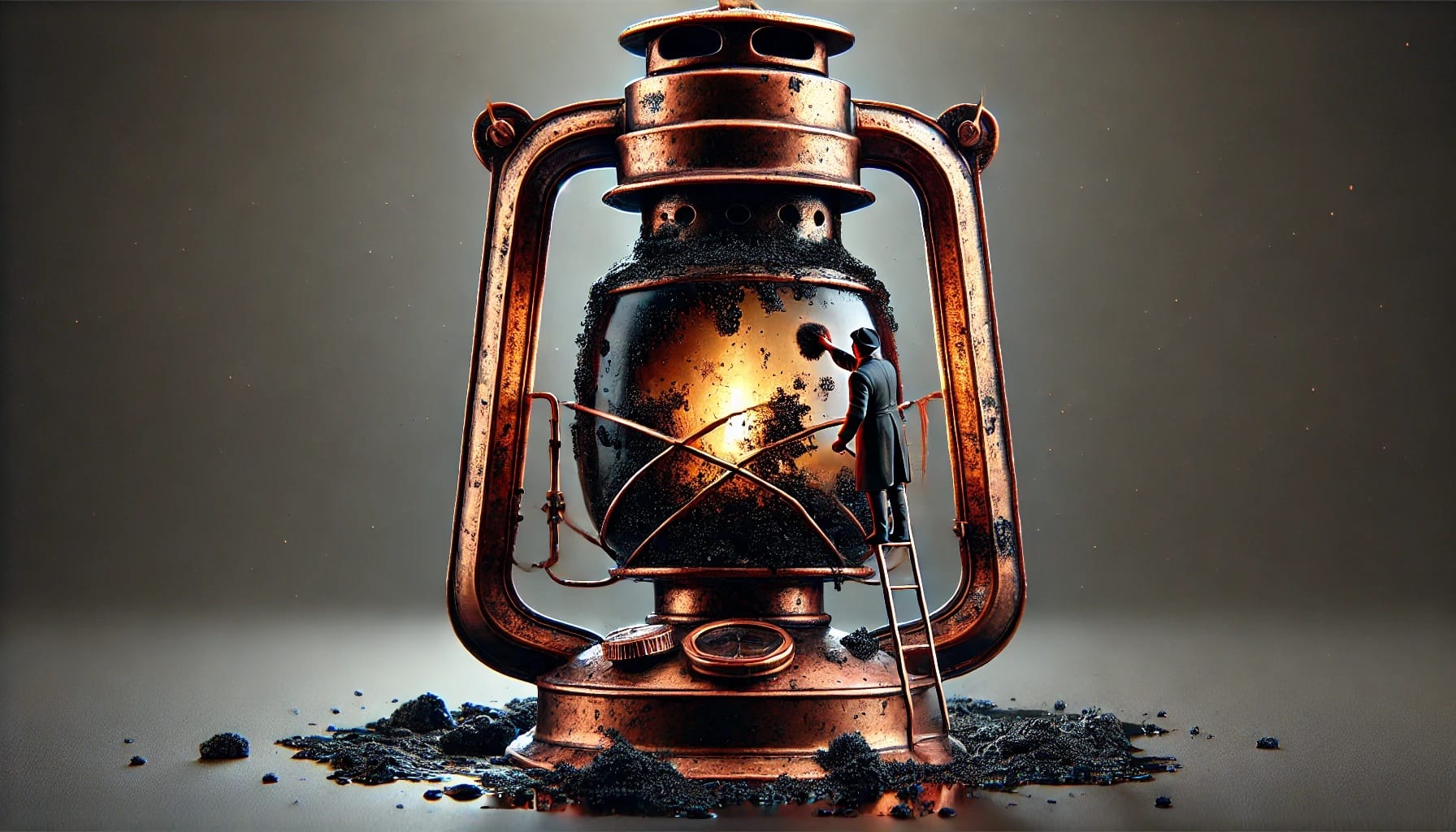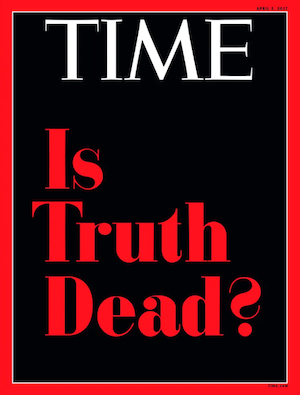
The rehabilitation of truth
You cannot build a secular civilization into the future without a kind of faith.
On April 3, 2017, mere weeks into Donald Trump's first term, Time Magazine’s cover asked, Is Truth Dead?

It was and remains a question well worth asking.
I believe the worst thing about Trump is his attitude toward truth. Trump has always been known as a liar. His 2024 reelection campaign only reemphasized his instinct to lie repeatedly, and often pointlessly, about any subject. Some of these lies, like the one about pet-eating immigrants in Springfield, Ohio, were so bizarre that then vice-presidential nominee JD Vance admitted that they were not true—just a way to attract attention to the immigration issue. This candor only cheapened truth further. Many of Trump’s supporters assume that he does not mean what he says and that he will not do all the things he promised to do during his campaign. In other words, it goes without saying that he lies, and will continue to do so, well into our national future.
Although this might be a reasonable surmise given his untruthful track record, Trump’s appointments and general indications since the election ironically suggest that he actually does mean to do the basic things he promised—tariffs, deportations, and tax cuts.
That's the trouble with a liar: You never know when he actually is telling the truth.
In the past nine years, the debasement of truth has proceeded rapidly in our culture. Trump paid no obvious political price for his lies. His basic argument for election—that crime, inflation and illegal immigration are worse than ever—are all demonstrably false. But he won handily, including an outsized majority in the Electoral College. More importantly, Trump won around 50% of the popular vote while greatly diversifying his base coalition.
This isn't just a question for election post mortems. It relates directly to the future. If we are going to build a healthy and thriving secular civilization, it will have to be on the foundation of rigorous respect for truth. How in a world of AI deep fakes and relentlessly lying politicians will that be possible?
Where the attack on truth really began
In order to start on the long road back to sanity, we have to understand where the denial of truth came from and to what it is connected.
Two points must be understood. First, the attack on truth began not with conservatives or populists, but on the political left. Second, the attack on truth is also an attack on tradition and authority, and these attacks also began, long ago, on the left.
For the origin of the attack on truth, you can go back to the perspectivalism of postmodernism in the late 20th century. The argument that science is an ideology and the dismissal of claims of objective and universal truth, made by people like Bruno Latour in his 1987 book Science in Action, helped spark the science wars of the 1990s.
This is not entirely fair to Latour, whose critique of modern science was quite nuanced. But he is perhaps best known for his work challenging the idea of an objective reality.
Latour's work suggests that facts are constructed by communities of scientists, and that there is no clear distinction between the social and technical aspects of science.
This popular understanding of Latour is a Nietzsche-inspired flirtation with nihilism. And it had real world effects. During the diversity overreach of the pandemic period, I had to object at my law school to references in the diversity materials to “Western-style science” as just one mode of truth, and a mode of truth compromised by colonialism, racism and sexism, at that.
I am not suggesting that challenges to science have nothing to teach us or that they are wholly wrong. I am saying that this critique is exaggerated. Furthermore, such perspectivalism was misinterpreted by the public, especially the educated public, to mean that everything is just a matter of opinion.
I mean that quite literally. For me, the symbol of the debasement of truth into mere opinion has always been what is essentially a poem at the end of Yale law professor Arthur Leff's 1979 article "Unspeakable Ethics, Unnatural Law":
As things now stand, everything is up for grabs. Nevertheless:
Napalming babies is bad.
Starving the poor is wicked.
Buying and selling each other is depraved.
Those who stood up to and died resisting Hitler, Stalin, Amin, and Pol Pot—and General Custer too—have earned salvation.
Those who acquiesced deserve to be damned.
There is in the world such a thing as evil.
[All together now:] Sez who?
God help us.
As a law professor, I can report that law professors still profess such nihilism today. That is why, when Originalism argued in the 1990s that it was the only alternative to personal judicial value judgments, it gained such credibility. The idea that the law over time reasons its way toward justice, which had been the foundation of legal method, was never seriously defended.
We are today beginning to see the need to wake up from this nihilistic dream. Before he died in 2002, Latour insisted that his criticisms were not to blame for climate change denialism. But we will need a thoughtful and intentional effort to put truth on defensible ground.
It's not just truth that needs defending
And not just truth. Trump also represents the repudiation of all forms of tradition and authority. As Mark Danner explained, “Trumpism could happen only after other, competing forms of authority had been mortally weakened.” Or, as New York Times columnist Bret Stephens put it, Trump’s actual aim is “to perpetuate the spirit of cynicism.” Trump is deviancy all the way down.
But, again, who started the attack on tradition and authority? It was the Enlightenment. And the charge is today often led by secularists. When Sam Harris announced The End of Faith—the title of his influential 2004 book—he was unwittingly undermining all institutions. Secularists like to be called skeptics. But as the philosopher Hilary Putnam reminds us, extreme skepticism is dogmatism.
Our goal should be the building of a secular civilization. But you cannot build a secular civilization without a kind of faith. Granted, it must be defensible faith. But if truth is real, then faith—in expertise, for example—can be warranted. Even without my knowing anything about science, I can have faith in the pronouncements of scientists about vaccines and climate change because the scientific tradition is worthy of respect.
Ideas, just like elections, have consequences. Our ideas paved the way for the collapse we see today. We were more complicit in the triumph of Trump’s nihilism than we would like to admit. Admitting that is the first step to reversing it.
